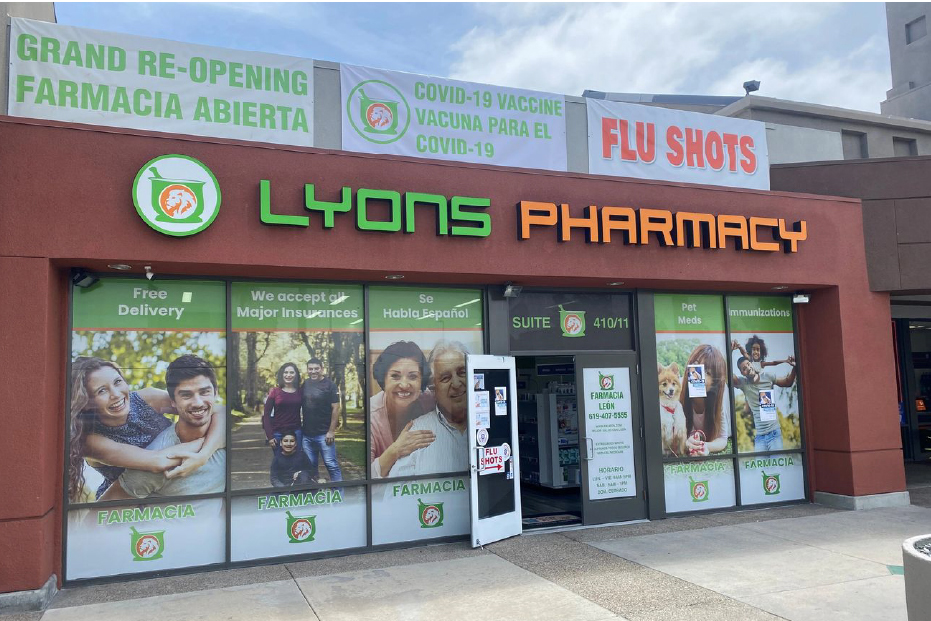

How impact investing can help underserved areas with access to capital
April 5, 2022
Photo: Dan Lyons
How close you live to a pharmacy may say a lot about the overall health of your community.
That’s especially true for many low-income neighbourhoods in the United States, where pharmacies are often the only place local residents rely on to access medicine and other essential health services.
Helping to fulfill the unmet needs of a predominantly Hispanic community in Chula Vista, San Diego was a big reason why Dan Lyons chose to open up his pharmacy in early 2020, after working as a pharmacist for two decades.
But just as his doors opened up, the world began to shut down.
“We opened two weeks before the pandemic and no one knew we were here,” Mr. Lyons recalls. “We couldn’t do any marketing and we were pretty close to closing.”
Within six months of opening, and with few customers, Mr. Lyons had run through his savings and feared he would have to shut down for good.
The pharmacist was sure his luck had run out until he received his own lifeline — a secured loan originated by CDC Small Business Finance, a mission-based lender focusing on providing small business owners with access to affordable and responsible capital.
The loan enabled Mr. Lyons to keep his pharmacy and, importantly, provide COVID-19 tests, vaccinations and boosters to the local residents, many of whom don’t have health insurance or were on Medicaid. (U.S. pharmacies were responsible for more than 70 per cent of COVID-19 vaccine administrations as of September 2021.)

How impact investing can help underserved areas with access to capital
April 5, 2022
Photo: Dan Lyons
How close you live to a pharmacy may say a lot about the overall health of your community.
That’s especially true for many low-income neighbourhoods in the United States, where pharmacies are often the only place local residents rely on to access medicine and other essential health services.
Helping to fulfill the unmet needs of a predominantly Hispanic community in Chula Vista, San Diego was a big reason why Dan Lyons chose to open up his pharmacy in early 2020, after working as a pharmacist for two decades.
But just as his doors opened up, the world began to shut down.
“We opened two weeks before the pandemic and no one knew we were here,” Mr. Lyons recalls. “We couldn’t do any marketing and we were pretty close to closing.”
Within six months of opening, and with few customers, Mr. Lyons had run through his savings and feared he would have to shut down for good.
The pharmacist was sure his luck had run out until he received his own lifeline — a secured loan originated by CDC Small Business Finance, a mission-based lender focusing on providing small business owners with access to affordable and responsible capital.
The loan enabled Mr. Lyons to keep his pharmacy and, importantly, provide COVID-19 tests, vaccinations and boosters to the local residents, many of whom don’t have health insurance or were on Medicaid. (U.S. pharmacies were responsible for more than 70 per cent of COVID-19 vaccine administrations as of September 2021.)

Impact investing to help underserved areas
RBC Global Asset Management (RBC GAM), the asset management division of Royal Bank of Canada, works with originators like CDC Small Business Finance to purchase high quality, government-guaranteed loans backed by the Small Business Administration (SBA) which, in turn, are often securitized and sold to impact investors. By doing so, RBC GAM can generate additional capital and increase the profitability of making loans in underserved areas at affordable rates.
Loans like the one to Lyons Pharmacy are exactly the kind of investment many impact investors, like ServiceNow, seek out. This publicly traded cloud-based platform company focuses on low-to-moderate income communities and is one of RBC GAM’s recent impact clients.
ServiceNow made a $100 million USD impact investment through RBC GAM’s Access Capital Community Investment Strategy with the initial intention of supporting Black communities in 10 regions across the U.S. where the company has significant operations and community presence. Its ServiceNow Racial Equity Fund supports homeownership, entrepreneurship, and neighborhood revitalization.
The ServiceNow fund is part of a growing number of corporations investing more to address racial inequality and promote social justice. From November 2020 to May 2021, companies committed $134 billion to racial equity causes, according to a report by McKinsey.
“There has been a significant uptick in impact investment over the past 24 months,” says Mindy Frye, an institutional portfolio manager at RBC GAM’s Minneapolis-based U.S. headquarters.
Frye notes that some people think such strategies are risky. In reality, they are “very liquid, fixed income solutions that don’t have to be complex or difficult. It is RBC GAM’s goal to be at the intersection of generating both competitive returns and social impact.”
Portfolios that support communities
RBC GAM’s Access Capital Community Investment strategy has approximately $2 billion assets under management with plans to grow. The strategy invests in projects that support community development including providing affordable rental units, housing for low-to-moderate-income buyers, small business loans, and nursing home beds.
The founder of the Access Capital Community Investment Strategy, Ron Homer, Chief Strategist of U.S. Impact Investing at RBC GAM says: “Home ownership is one of the greatest contributors to wealth creation but, historically, Black and Latinx communities have been underserved by traditional lenders offering loans at the same competitive rates available to the broader public. These are systemic racial imbalances that can prevent communities from reaching their full potential. By partnering with ServiceNow, we have extended access to capital for lenders making loans in Black and Latinx communities that will help to ensure real, lasting wealth creation opportunities for residents.”
Visit RBC GAM’s impact investing website to learn more about how individual investors, financial advisors and institutional investors can get involved with impact investing.
A word from our lawyers
This article offers general information only and is not intended as legal, financial or other professional advice. A professional advisor should be consulted regarding your specific situation. While information presented is believed to be factual and current, its accuracy is not guaranteed and it should not be regarded as a complete analysis of the subject matter discussed. All expressions of opinion reflect the judgment of the author(s) as of the date of publication and are subject to change. No endorsement of any third parties or their advice, opinions, information, products or services is expressly given or implied by Royal Bank of Canada or its affiliates.
Impact investing to help underserved areas
RBC Global Asset Management (RBC GAM), the asset management division of Royal Bank of Canada, works with originators like CDC Small Business Finance to purchase high quality, government-guaranteed loans backed by the Small Business Administration (SBA) which, in turn, are often securitized and sold to impact investors. By doing so, RBC GAM can generate additional capital and increase the profitability of making loans in underserved areas at affordable rates.
Loans like the one to Lyons Pharmacy are exactly the kind of investment many impact investors, like ServiceNow, seek out. This publicly traded cloud-based platform company focuses on low-to-moderate income communities and is one of RBC GAM’s recent impact clients.
ServiceNow made a $100 million USD impact investment through RBC GAM’s Access Capital Community Investment Strategy with the initial intention of supporting Black communities in 10 regions across the U.S. where the company has significant operations and community presence. Its ServiceNow Racial Equity Fund supports homeownership, entrepreneurship, and neighborhood revitalization.
The ServiceNow fund is part of a growing number of corporations investing more to address racial inequality and promote social justice. From November 2020 to May 2021, companies committed $134 billion to racial equity causes, according to a report by McKinsey.
“There has been a significant uptick in impact investment over the past 24 months,” says Mindy Frye, an institutional portfolio manager at RBC GAM’s Minneapolis-based U.S. headquarters.
Frye notes that some people think such strategies are risky. In reality, they are “very liquid, fixed income solutions that don’t have to be complex or difficult. It is RBC GAM’s goal to be at the intersection of generating both competitive returns and social impact.”
Portfolios that support communities
RBC GAM’s Access Capital Community Investment strategy has approximately $2 billion assets under management with plans to grow. The strategy invests in projects that support community development including providing affordable rental units, housing for low-to-moderate-income buyers, small business loans, and nursing home beds.
The founder of the Access Capital Community Investment Strategy, Ron Homer, Chief Strategist of U.S. Impact Investing at RBC GAM says: “Home ownership is one of the greatest contributors to wealth creation but, historically, Black and Latinx communities have been underserved by traditional lenders offering loans at the same competitive rates available to the broader public. These are systemic racial imbalances that can prevent communities from reaching their full potential. By partnering with ServiceNow, we have extended access to capital for lenders making loans in Black and Latinx communities that will help to ensure real, lasting wealth creation opportunities for residents.”
Visit RBC GAM’s impact investing website to learn more about how individual investors, financial advisors and institutional investors can get involved with impact investing.
A word from our lawyers
This article offers general information only and is not intended as legal, financial or other professional advice. A professional advisor should be consulted regarding your specific situation. While information presented is believed to be factual and current, its accuracy is not guaranteed and it should not be regarded as a complete analysis of the subject matter discussed. All expressions of opinion reflect the judgment of the author(s) as of the date of publication and are subject to change. No endorsement of any third parties or their advice, opinions, information, products or services is expressly given or implied by Royal Bank of Canada or its affiliates.